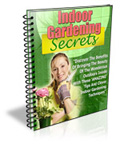Welcome to Gardening Guide
127. VEGETABLE GARDENING FOR BEGINNERS Article

VEGETABLE GARDENING FOR BEGINNERS
from:You want to start your first vegetable garden, but you donít know how to begin. Donít worry. Vegetable gardening for beginners is not difficult. Many vegetables are actually easier to cultivate than flowers.
Basically, vegetables are sun lovers. They need at least six hours of sunlight a day, so select a garden spot that does not get a lot of shade. Some leafy vegetables like lettuce, spinach and endive like some shade during the day, but vegetables that must develop roots, like carrots, beets, tomatoes, peppers, squash and radishes need a lot of sunlight. Another good point for vegetable gardening for beginners is to be wary of low areas where water tends to stand after a rain.
You need good, loamy soil that is well drained. If your garden site does not have ideal soil, you can improve it with good soil management. There are many books on vegetable gardening for beginners that will tell you how to do this, and you can get good advice at a garden centre.
A flat garden is the easiest to tend, but if you must plant on a slope, place your rows along the slope, not up and down. This will prevent erosion and provide the plants with the maximum amount of rainwater. A good mulch will also help catch the water and prevent erosion. If the hill is steeply sloped, you will have to terrace it with stones or wood.
Another rule of vegetable gardening for beginners is to have your garden near a water supply, even if it is just a garden hose. Vegetables are ninety percent water, so soil moisture is vital if your crops are going to develop. A heavy mulch will help your garden soil stay moist, but the crops will still need about an inch of water a week, either from the rain or from irrigation.
Another suggestion about vegetable gardening for beginners. If you live on a large property or in a rural area, try to have the garden as close to the house as possible. There are several reasons for this. The nearer the garden is to the house, the easier it will be to tend. It also means you wonít have far to carry your crops back to the house. It will be convenient for you to step outside and fetch fresh vegetables even while youíre preparing a meal. Close proximity to the house will also help discourage four-footed raiders like raccoons, rabbits, deer and opossums that would make short work of the vegetables in your garden. It might be a good idea to put up a fence.



